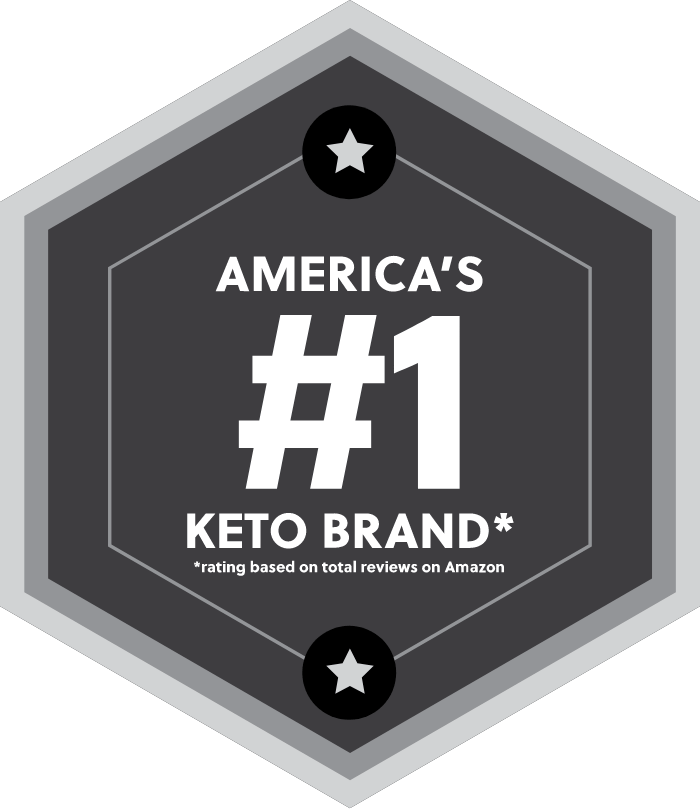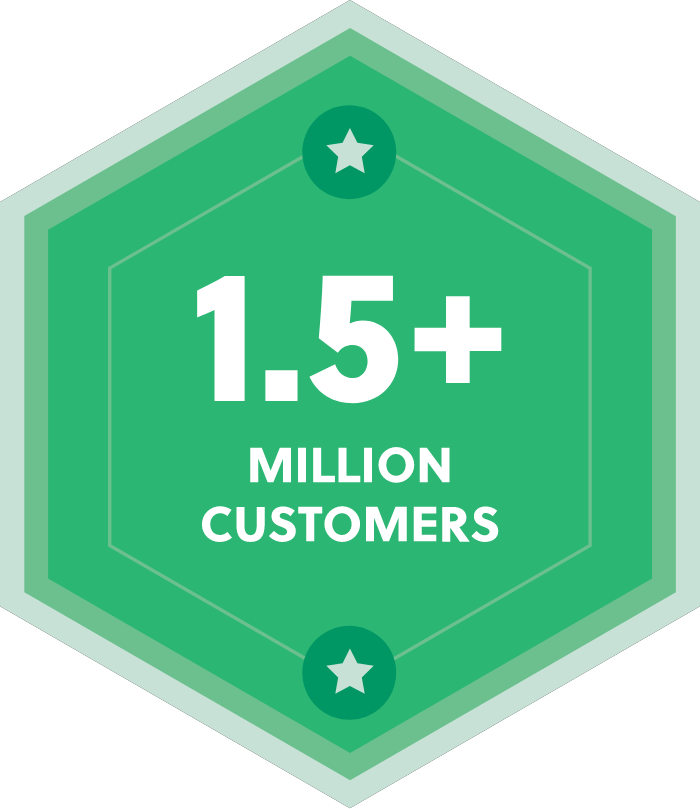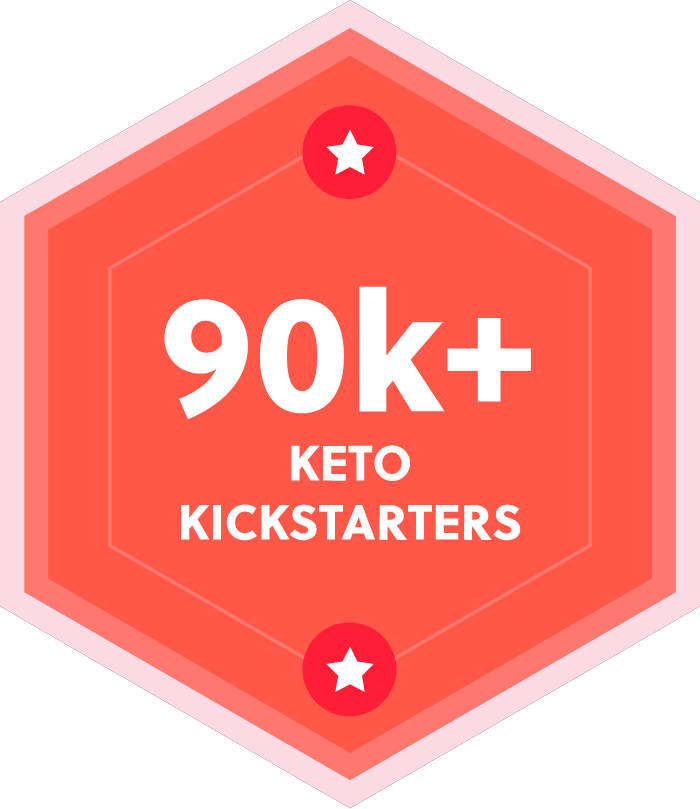Your 30-Day Step-by-Step Guide to Starting and Succeeding with Keto
Begin your Keto Kickstart completely free → Get Started
It's overwhelming, right?
The number of diets out there. Each with their own set of rules, Good Foods, Bad Foods… some even have their own systems of measurement.
(What the heck is a SmartPoint?)
It’s no wonder we feel like we can’t lose weight sustainably (or keep it off).
But the beautiful truth is: you totally can.
And it doesn’t have to be a constant struggle.
Keto Kickstart is a doctor-developed, step-by-step program that teaches you how to:
- 🔥 Start losing weight (and keep it off for good)
- 🥩 Cook satisfying, delicious, and simple low-carb meals like a pro
- 🍽 Dine out and travel without undoing your hard work
- 💪 Workout to lose fat
- ✌️ Manage stress, a devious weight loss saboteur
- 😴 Enjoy better sleep (critical for optimal weight loss)
Maybe your goal is to lose that COVID 15. Maybe it’s stubborn baby weight.
Regardless, we believe you shouldn’t have to go to med school to know how to drop those pounds.
That’s why we made Keto Kickstart.
No complicated lingo or new systems of measurement.
Just a simple, step-by-step, easy to follow guide designed to help you lose weight, up your energy, and banish cravings.
Every day, you’ll know exactly:
- What to eat
- How to workout
- How to easily track your progress
No guessing.
No complicated measurements.
Just a simple plan designed to give you results.
We’ll walk you through everything you need in your first 30 days.
But we’re confident that these tools will empower you for life.
Ready to take control?
sign me up


Is this going to be a month of terrible food? Absolutely not!
Goodbye tiny portions of tasteless, boring food.
Hello amazing, filling meals with vibrant flavors.
Food is part of what makes life wonderful and our Keto Kickstart program has compiled some of the most delish, nutritious, easy low-carb recipes for you to enjoy every day.
Take a peek:
Monday

Tuesday

Wednesday

Thursday

Friday

Saturday

Sunday

But will this work for me?
We first released Keto Kickstart in 2019 and, since then, over 92,000 people have gone through the program.
This helped us zero in on the habits and tools that truly help participants lose weight (and the ones aren’t so helpful...we left those out).
ALL their feedback has been implemented into this year’s program to maximize your chances of weight loss success.
The ketogenic diet works.
Here are some of the most inspiring keto transformation stories from our Perfect Keto community:
before
after

Angela's Weight Loss Transformation
weight lost: 130 pounds
“Before I started keto, I weighed 355 pounds at 27 years old. I started to not be able to walk with my coworkers to get lunch, on work trips I was the only that needed a seat belt extender. I was miserable, carb overloaded and knew that I needed to change. While being on keto I’ve noticed so many positive changes in my life. Not only am I dropping all this weight, I notice how much more energy I have and how clear my mind is. Before I would be exhausted after lunch, now with eating high quality fats have so much energy.”
before
after

Christina’s Weight Loss Transformation
“Keto is 100% for me and it makes me happy. I love all the foods considered ‘keto’. I can wear a bikini with confidence! Perfect Keto products have helped me have confidence and each product is worth every penny. I like using most of the products for everyday life. I use them before, after, and during workouts. I use them as treats, snacks, meals, and desserts.”
before
after

Amanda’s Weight Loss Transformation
“I was very overweight and unhealthy. I saw a photo of myself on vacation and my body didn’t match how I felt on the inside. I felt so unhealthy all the time and knew I needed to make a change. I tried every other diet. From counting calories, point systems, and going vegan. Nothing worked. I always felt hungry and that the food cravings were just too much to resist. After keto, I have so much more energy and confidence to go after things I want. I became a fitness instructor at a cycle studio and love being active. I have perfect blood test and feel so much healthier than I ever felt possible.”
before
after

Maria’s Weight Loss Transformation
“Before keto I was miserable. I struggled with disordered eating and yo yo dieting. I chose keto because all other diets were not working. I thought low fat was the way to go but it never worked! Keto helped me get over my fear. Not only am I seeing results but my mental health has improved. I have learned that fat is not the enemy. I learned that my body did not like carbs and sugar. I can actually satisfy my hunger now with keto.”
before
after
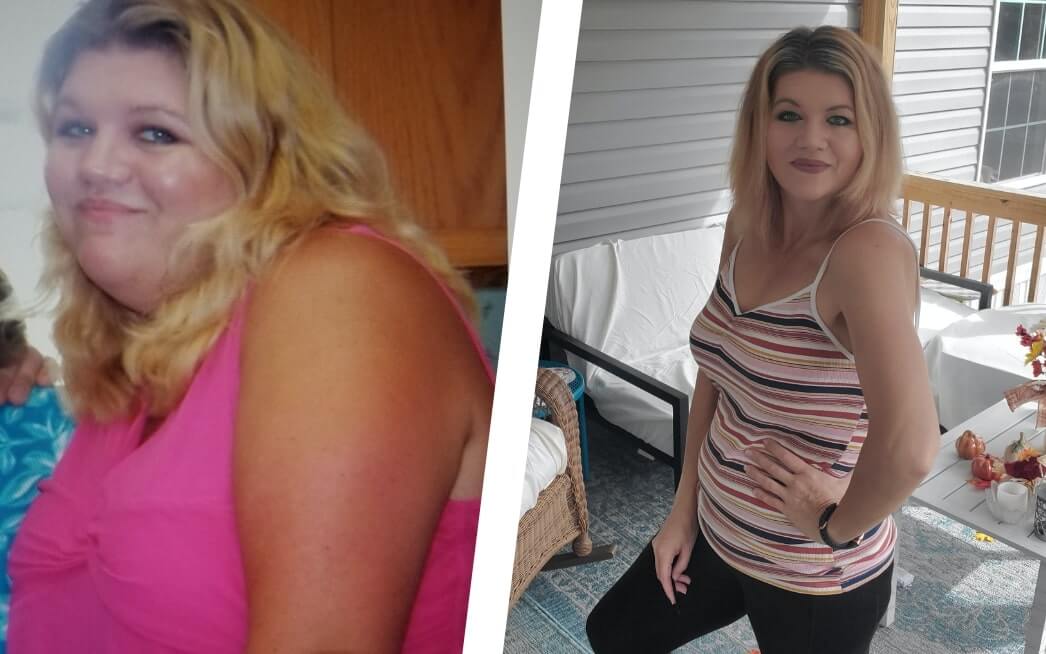
Jelly’s Weight Loss Transformation
“My heart doctor told me I was days away from congestive heart failure and I tried every diet known to me (even an ice cream diet), but nothing ever worked. I went from not being able to stand more than 10 minutes to hiking a mountain in Hawaii. I can do anything now. I’m off all my meds but one (which I’m almost off of). I even have my PCOS under control. No more type 2 diabetes. I’ve cured so many of my illnesses.”
Other Results
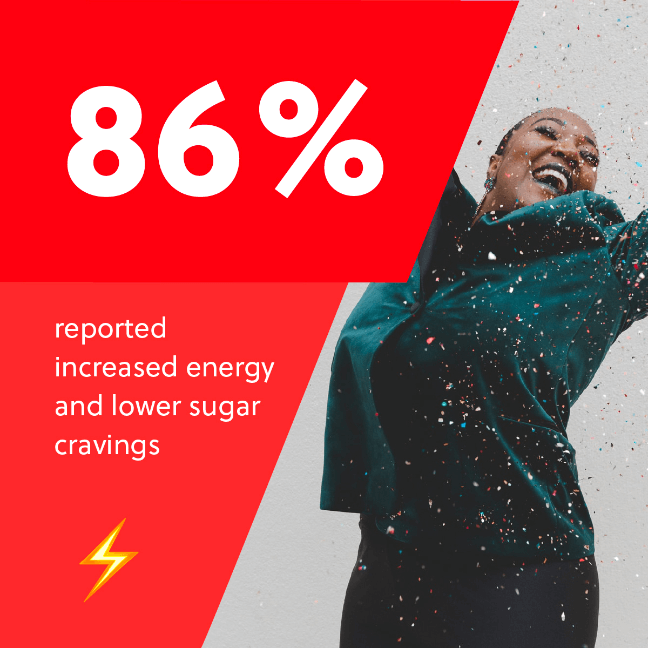

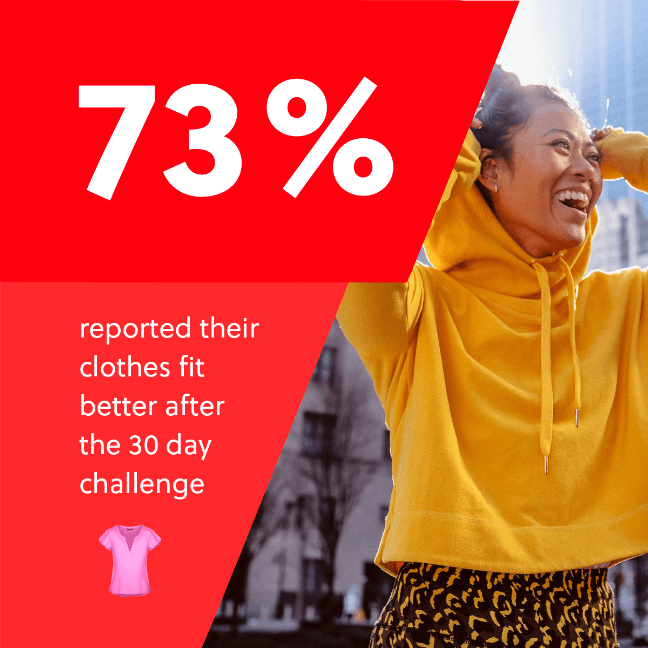
If you’re not fully convinced yet... Keto Kickstart is about so much more than looking good in a bathing suit (although that rocks).
🏃🏼♀️ 86% of participants reported increased energy and lower sugar cravings
🧘🏽♀️ 80% reported less hunger
💃 73% reported their clothes fit better after the 30 day challenge.
Increased energy means you are able to spend more time playing with your kids, the two-legged and four-legged kind. 🐶
Less hunger means you’re able to focus on what matters and bring your best to that next paper or presentation.
And when your clothes fit, you’re more comfortable and confident!
More energy. Fewer cravings. More confidence. Less hunger.
This is all waiting on the other side of 30 days.
i want thisDo you need
Keto supplements?
It’s totally possible to rock the keto life without any additional supplements.
For a keto beginner, though, a few key supplements can make a difference because they...
- make it easy to get in ketosis
- reduce potential negative side effects that happen during your transition to ketosis, also known as the ‘keto flu’
- boost your endurance so you burn more fat
- give you low-carb drink and snack alternatives to curb cravings
It’s not uncommon for new ketoers to have headaches, fatigue, and muscle cramps as their bodies adjust to the lack of sugar and carbs.
Not fun, trust us we know. 👎
This is where supplements can help.
Our Keto Kickstart Bundle includes a few products* that minimize these symptoms and make keto way easier:
- Exogenous Ketone Base – Helps you get in ketosis and boosts your mental and physical energy
- Keto Collagen – Supports your skin health, hair and nail health, gut health, joints, and exercise recovery
- MCT Oil Powder – Deliciously delivers keto-friendly fats that convert directly into ketones to help you get into ketosis faster (and stay there)
- Keto Bars – Crush those afternoon snack attacks the keto way and curb hunger in between meals
- Daily Electrolytes – Replenish electrolytes and rehydrate you to banish cramps, headaches, constipation, and fatigue
You can get your Keto Kickstart Bundle in 4 incredible flavors. Just choose your favorite:
- Best Sellers Keto Kickstart Bundle
- Peanut Butter Chocolate Chip Keto Bars
- Vanilla MCT Oil Powder
- Chocolate Keto Collagen
- Chocolate Keto Base
- Pink Lemonade Daily Electrolytes

- Peanut Butter Chocolate Keto Kickstart Bundle
- Peanut Butter Chocolate Chip Keto Bars
- Peanut Butter MCT Oil Powder
- Peanut Butter Keto Collagen
- Chocolate Keto Base
- Pink Lemonade Daily Electrolytes

- Chocolate Keto Kickstart Bundle
- Chocolate Chip Cookie Dough Keto Bars
- Chocolate MCT Oil Powder
- Chocolate Keto Collagen
- Chocolate Keto Base
- Pink Lemonade Daily Electrolytes
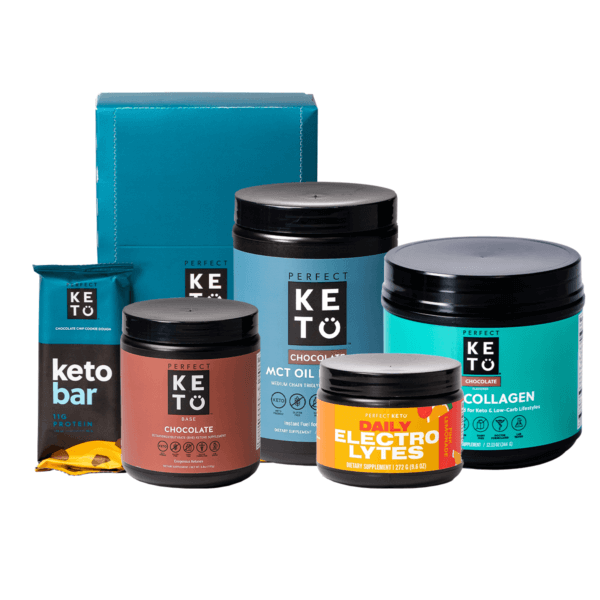
- Salted Caramel Keto Kickstart Bundle
- Salted Caramel Keto Bars
- Salted Caramel MCT Oil Powder
- Salted Caramel Keto Collagen
- Salted Caramel Keto Base
- Pink Lemonade Daily Electrolytes
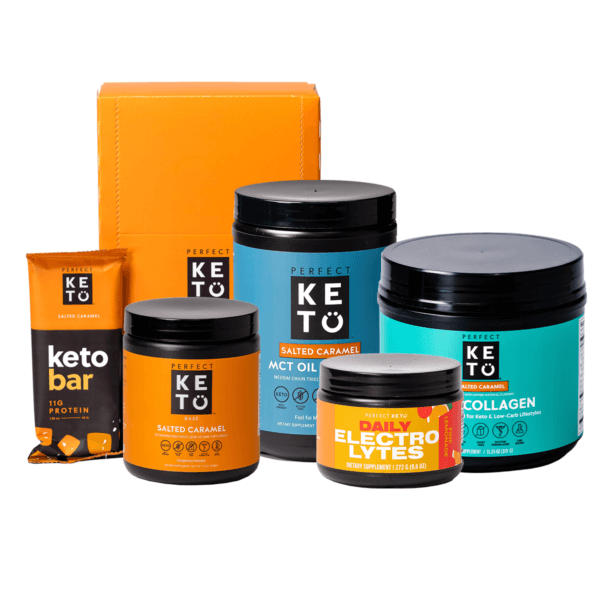
*These MVP, fan-favorite products normally cost over $186 combined.
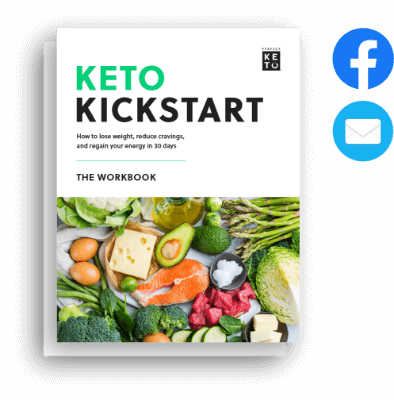
Kickstart
Kickstart Program
Accountability Group
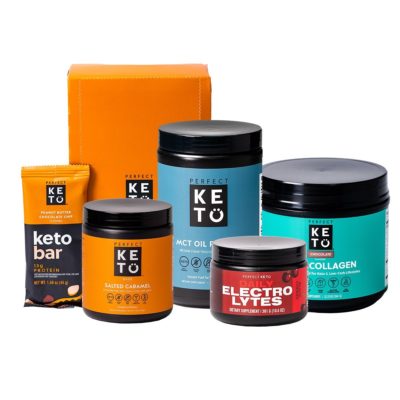
Advanced — $99
Kickstart Program
Accountability Group
Keto Collagen · Keto Base · MCT Oil
Powder · Keto Bars · Daily Electrolytes
Frequently Asked Questions
Q: Is the keto diet safe?
A: Yes! A keto diet done correctly is helpful for reducing inflammation, preventing heart disease, boosting your energy, supporting healthy blood sugar levels, increasing fat loss, and improving your cognitive function.
Q: How much weight can you lose on the keto diet?
A: Since everyone is different, it’s hard for us to give an exact answer. Most people surveyed reported that their clothes generally fit better, they are less hungry, and have more energy after participating in Keto Kickstart. Check out the inspiring before-and-after stories to get a feel for keto’s potential.
Q: Is fasting important on keto diet?
A: Intermittent fasting is a great tool for weight loss, energy, mental clarity, and more. But it’s not absolutely required, especially if you are just starting your keto journey. You can incorporate it into your routine as you get used to living keto.
Q: What should you eat and avoid on keto diet?
A: Keto is low-carb, high-fat, and moderate-protein. But where you get your carbs, fats, and protein from is super important. Keto Kickstart includes a shopping list and explains what foods serve your body best.

The Perfect Keto Risk-Free,
Quality Guarantee
We want you to be happy with any and every Perfect Keto purchase you make, so we have a 30-day risk-free, quality guarantee.
If you give Keto Kickstart your best effort and you find that it’s not a right fit for you, just contact us within 30 days of purchase and we will take care of your refund.
We are here to help you with your health, period.
If you aren’t ready to commit to paying for the VIP or Advanced Programs right now, we understand. Start with the free version, follow along with the emails and daily checklist, and then sign up for the bonus features when you are ready to take your keto-transformation to the next level.

